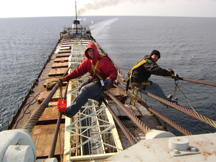
With so much attention directed at other things in Washington, such as partisan fighting, brinksmanship and the chronically delayed surface transportation bill, our ports and maritime industry sort of need a foghorn on steroids to get someone’s attention.
Well, now more than 180 House lawmakers – yes on both sides of the aisle – are paying attention. And Senators are starting to stir as well. They need to step up their game and become vocal. Our 32-member Executive Committee stepped up its game in March when it vowed to push for action on critical maritime infrastructure investments through passage of the RAMP Act (H.R.104/S.412).
Unfortunately, the House and Senate surface transportation bills fall short on a meaningful maritime title. This is disappointing, given that inaction jeopardizes a sector that supports 500,000 jobs, and disturbing when you consider the role maritime plays in balancing international trade and moving our top exports. More to the point, when President Obama took office he vowed to double exports as part of our nation’s economic revival. We support him but his plan will be derailed if we don’t invest more in the port and maritime sector. It is that simple.
Beyond the economic arguments that favor significantly more investment in this sector, are the humanitarian ones; U.S. maritime also ships billions in humanitarian aid to nations throughout the world, a very American ideal.
Why then do we continue to fall behind many other nations in funding our critical port infrastructure components? China, for example, plans to invest $40 billion in its ports over the next five years – more than the U.S. has invested since before Apollo 11 landed on the moon. This is pitiful. I’m sorry, but how is it we seem perpetually puzzled about why the U.S. continues to fall behind on the global competitiveness scale? I think the answers are fairly obvious.
That is why the RAMP Act is so important. This bill, introduced last year by Reps. Charles Boustany (R-LA) and Joe Courtney (D-CT), would ensure that funds collected under the Harbor Maintenance Tax (HMT) are actually spent on harbor maintenance such as dredging. What a strange concept! Currently, we spend barely half of what is needed on dredging leaving our ports vulnerable in a delicate but fiercely competitive global economy. In a year filled with head-scratching proposals for our transportation system, this is a no-brainer.
A companion bill has been introduced in the Senate by Sens. Carl Levin (D-MI) and Kay Bailey Hutchison (R-TX). We hope these important pieces of legislation aren’t left floating in congressional purgatory for another few years. Their enactment is far too critical to our economy, our job growth and America’s competitiveness in a world where nations are more and more defined by the quality of their transportation infrastructure.
We also need expansion of the intermodal principles that were established in the Ferry Boat Discretionary Program. To provide for the future growth of ferry systems throughout the country, the nation needs to increase funding for the construction of ferries and ferry terminal facilities. This type of investment increases transportation options for local communities, creates a more efficient intermodal transportation network, and creates quality construction and operating jobs. From an economic perspective, it’s the gift that keeps on giving.
Transportation unions will loudly advocate policies that boost investment in harbor maintenance and intermodal freight infrastructure grants. The RAMP Act is a good start – it simply says let’s start spending funds dedicated for port and maritime investments on the projects they were intended to support. Sort of the un-Washington.
Let’s get it done.
-Ed Wytkind
@EdWytkind